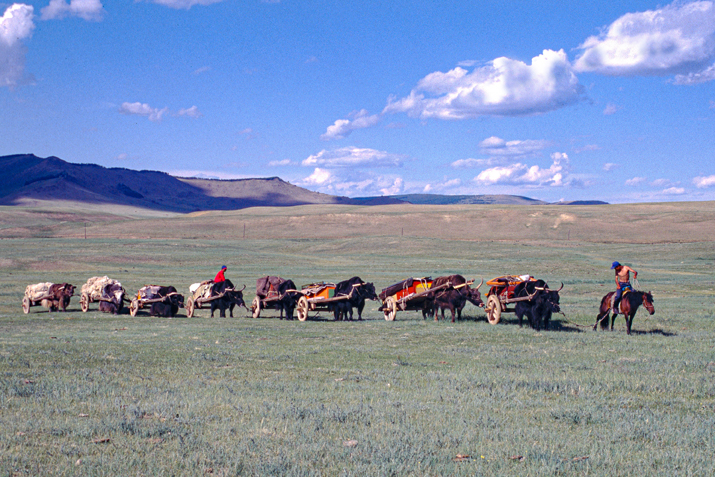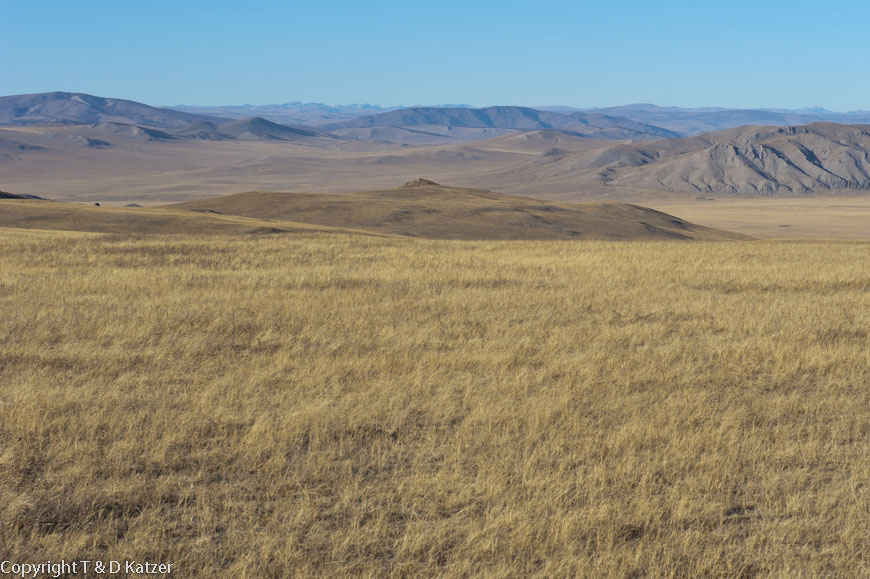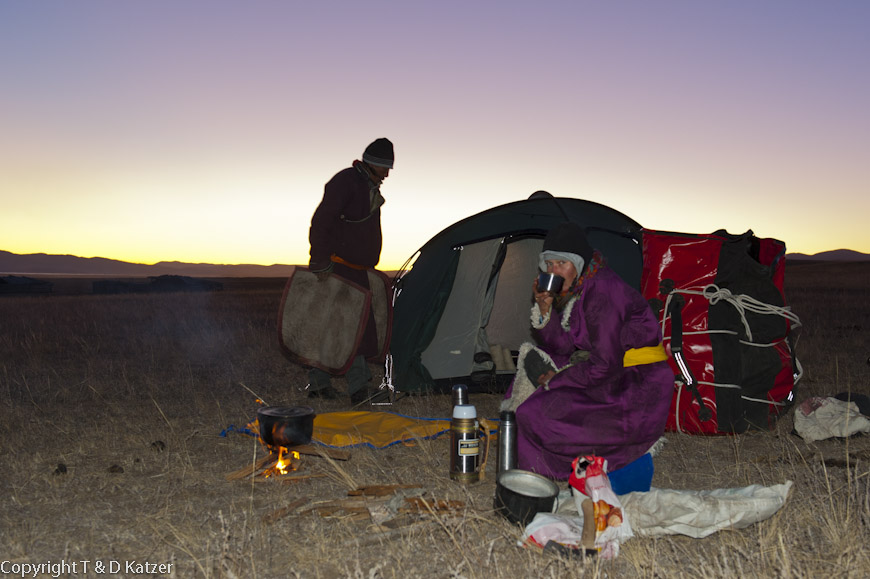
Bitten and kicked
N 49°58'999'' E 100°03'183''
Day: 90
Sunrise:
07:52
Sunset:
18:16
As the crow flies:
24,54
Daily kilometers:
32
Total kilometers:
833
Soil condition:
Meadow, scree
Temperature – Day (maximum):
5°C
Temperature – day (minimum):
minus 4°C
Temperature – Night:
minus 18°C
Latitude:
49°58’999”
Longitude:
100°03’183”
Maximum height:
1900 m above sea level
Time of departure:
12:30
Arrival time:
18:1ag: 90
Sunrise:
07:52
Sunset:
18:16
As the crow flies:
24,54
Daily kilometers:
32
Total kilometers:
833
Soil condition:
Meadow, scree
Temperature – Day (maximum):
5°C
Temperature – day (minimum):
minus 4°C
Temperature – Night:
minus 18°C
Latitude:
49°58’999”
Longitude:
100°03’183”
Maximum height:
1900 m above sea level
Time of departure:
12:30
Arrival time:
18:15





We slip out of our warm sleeping bags with the first rays of sunshine. Despite the minus 14 degrees at night, we didn’t freeze. “How was your night Bilgee? Were you freezing?” Tanja asks him. “Hujten” (“Cold”), he replies. “We have to think of something or he’ll freeze to death,” Tanja considers. “Well, we wanted to buy him a Deel but he didn’t like it. Now the temperatures are dropping more and more and he doesn’t have a winter coat. But he knew that. He’s Mongolian and lives here,” I reply. “But we still have to come up with something.” “Yes, yes, but what?” I ponder. “I’ll give him one of our hot water bottles today. That will help,” Tanja replies. “I hope he’s not too proud to accept them,” I reply. “We’ll see.” “Well, maybe you’re right. As it gets colder, all pride disappears. Even Mongolian pride,” I can well imagine.
While Bilgee and Tanja lead the horses to open parts of the almost frozen stream, I pack up our tent and equipment. It takes them an hour to bring the horses back to camp. “What was going on? Why did it take so long?” I ask. “The stream froze over again overnight. It took us a while to find a hole in the ice,” explains Tanja. “Well, if we leave so late every day, we’ll soon have a problem,” I say a little grumpily, although I know that everyone here is doing their best. “Denis, what are we supposed to do? It couldn’t be quicker,” Tanja justifies herself. “Yes, yes, I know. It’s not meant as a reproach. Just an observation.”
In the meantime, I have packed all the duffel bags and courier bags evenly and made them ready for loading. Bilgee and I heave up two duffel bags tied together to put them on Sharga’s back. “Ahhh!” I yell in horror, feel a piercing pain in my right shin, drop the duffel bag and jump back. “What’s going on?” asks Tanja in astonishment. The bitch bit me,” I shout, examining the bite. “Bad?” she asks. “I don’t think so. Lucky you,” I reply, massaging my shin. Then we lift up the two fallen sacks again as if nothing had happened and load them onto the biter again. This time, however, Tanja holds his reins while Bilgee and I work on the horse. Before we set off, I use a new technique to tie the muzzle around Mogi’s muzzle. “Impossible to bring him down. It can’t be that a dog is constantly tricking us,” I say confidently. “That’s right, it would be even nicer,” Tanja encourages me.
Because of the long way to the ice river, the packing, the store, the bite and Mogi’s muzzle, we don’t set off again until 12:30. We immediately start the ascent to a hilltop. Trotting is out of the question. We only make progress with difficulty. The sight of Mogi, however, is terrible. He shuffles along behind us as if he were carrying unspeakably heavy loads. I keep looking around for him. Suddenly, a kind of current of energy sweeps through him again. He reaches into his familiar bag of tricks and whirls around. Then he plows the stony ground as if it were soft sand and when that doesn’t help, he does the toe drag. The muzzle stretches, stretches even more and…holds firm. “Ha, ha, ha. I neigh triumphantly like a horse that has discovered a sack of oats. Tanja and Bilgee also laugh their heads off. “You see. I told you so. It would be a laugh if he could continue to trick us. This time my special lacing held.” Mogi gives us an offended look and now shuffles even more slowly behind us. “Come on, my four-legged friend. Get used to it or don’t bite defenseless sheep and goats in the butt!” I shout in relief. Mogi acknowledges my mirth with a second attempt to break out. Whirlwind, evil plow and even worse toe dragger. “Ha, ha, haaaa!” I snort until my laughter gets stuck in my throat. Mogi is free. He shoots past us, bouncy and happy as a lark. “Woof! Woof! Woof! A fine game. Shall we play it again?” he barks at us. “You stupid dog!” I reply, jumping out of the saddle and ordering him to come to me. It takes time for Mogi to arrive. So far we haven’t had enough time to teach him to come and stay. I clip two carabiners from my camera bag and attach them to the left and right of his muzzle. I attach the other side of the carabiner to his collar. As metal cannot stretch, Mogi is now welded into his muzzle. Ignoring his sad look, I heave myself back into the saddle. Because of his stubbornness, my aching shin and the renewed loss of time, I push Sar forward in a bad mood. Tanja and Bilgee follow me. Only minutes later, Mogi happily pants past me. The muzzle is off. “I could tear my hair out! It’s strange what challenges there are on a horse expedition like this,” it goes through my head. Defeated, we ride on. “Leave him alone. There’ll be no more sheep from now on,” says Bilgee, because he also wants to make distance and not have to wait all the time because of the dog.
We ride on with an uneasy feeling. “I wouldn’t let him run without a muzzle Denis,” says Tanja. “But he always gets it down. What are we supposed to do? Maybe Bilgee is right and there won’t be any more sheep from now on,” I reply resignedly. “You don’t believe that yourself!” Tanja calls after me. Just one kilometer further on, the load of boron forces us to stop again. We get out of the saddles and tie up our loads again. Just as I lift the large equipment bag so that the opposite duffel bag can slide into the correct position, Bor steps out and hits me exactly where Sharga had bitten me in the shin just before. “Ahhhh!!!” I roar again and feel the pain flash through my brain like lightning. I let go of the luggage again and stumble back. “For God’s sake! What is it?” exclaims Tanja, startled. The fucking animal kicked me. Can’t be true. Why always me? And then right on the spot that Sharga had previously chosen for his stupid bite! Man, man, man, I can’t believe it,” I moan, examining my leg. Tanja comes rushing in immediately. “And is it bad?” “Nothing broken if that’s what you mean. But it hurts like hell,” I reply, rubbing a few tears of pain from my eyes. A few minutes later I had recovered to some extent. We invite Bor again. Before continuing, Bilgee ties up Mogi’s bite inhibitors. As an experienced horseman, this time with real special horse knots and additional leather straps. Mogi is now so crammed into his muzzle that he will most likely lose his sight and hearing. “It doesn’t look good somehow,” I say. “You mean he can’t breathe?” asks Tanja. “I don’t know. I hope he doesn’t freak us out now,” I reply. “We’ll see. If he brings it down now, he’ll have to take his head off,” she replies.
Then I heave myself into the saddle, really battered and bitten. “Choo! Choo! Tschuuuu!”, we urge our horses on until they fall into a trot. We are finally making up ground and making progress. Tanja pulls Mogi behind her on the leash to see if Bilgee’s tether really holds. As always, when he has his snout in that annoying thing, he acts like an old man, an ancient man. This time, however, the knot is so tight that Mogi simply falls over after a few hundred meters. Before Tanja can rein in her horse, Mogi is pulled a few meters behind. “You’ve won, Mogi,” she says and frees him from the muzzle once and for all. Yelping happily, he now tugs at the lead and would love to overtake Tanja’s horse. From this point on, Mogi remains a burden for Tanja, as he pulls incessantly and powerfully on the leash or, if necessary, lets himself hang back like an ancient old man. I am also affected because from this moment on I always have two instead of one packhorse in tow. It is impossible to let Mogi run free because of his hunting instinct. The trouble we have already had because of this is enough to refrain from repeating it.
As soon as we cross another mountain ridge, we catch sight of several herds of sheep and goats. “You see. The next catastrophe would be on its way here at the latest,” says Tanja. “So Bilgee was wrong. It looks like every last corner of the country is populated by the little grass-eaters,” I reply and am really glad to have Mogi on a lead. With great effort for man and beast, we now trot for hours through a breathtakingly beautiful mountain landscape, which becomes ever higher and more rugged in the north. On a mountain ridge I pull out my GPS. “How high are we?” asks Tanja. “Just under 1,900 meters,” I reply. From up here, we can look out over the impressive landscape like an eagle. Barren but impressive mountains rise up from the bare valleys. We haven’t seen green for a long time. Everything is brown or yellow. In front of us lies a lake with several herds of sheep, goats and cattle drinking on its ice-covered shores. “Look over there! Those are camels!” I shout, pointing to an endless grassy landscape. In the middle of the yellow pasture, large animals are feeding, with two humps rising from their backs. As we have covered around 11,000 kilometers with camels over the past few years and lived with them for years, memories suddenly come flooding back to us. Crossing the Sinai desert, 1,600 km through Pakistan, 1,500 km through the Taklamakan desert, hundreds of kilometers through the Gobi desert and 7,000 km through Australia. “Traveling with camels is really something special,” I say, looking longingly at them as we sit on the grass and eat our snacks. “That’s right. We could have crossed Mongolia on camels,” Tanja replies. “Yes, but I think we’re better off with horses in the north.” “And apart from that, it’s also nice to be out and about with horses,” Tanja replies. “Yes, horses have their charm too,” I agree with her.
The continuous trot takes you through a seemingly endless valley. Herds of yaks, cattle and camels take us in as we criss-cross through their herds, only to spit us out again on the other side like a foreign body. “We should camp over there at the edge of the mountain,” says Bilgee, pointing to the slope illuminated by the flaming sunset. “A good idea,” I reply as it gets colder with every passing minute. We stop not far from an animal kraal and a wooden feed store for the winter. Stiff from the endless trotting, with a sore shin and the exertions of the day, I slip out of the saddle. In the meantime, I have found a technique to simply let myself slide down. Tanja’s Deel is decidedly lighter. Firstly, it is sewn for a woman and secondly, the ladies here also value a fashionable appearance. Yes, even here in the steppe. Slim is beautiful. Another reason why the thinner skins of younger sheep were used in their Deel. As women freeze earlier than men, it is difficult for us Europeans to understand why fashion is put before purpose in such a cold country. But there is also something good about it. Tanja gets out of the saddle more easily and is not pushed down by gravity like I am. When I walk around with the Deel, I feel so heavy that every step and every action is exhausting. “But it’s warm,” says Tanja. “Yes, and that seems to be the main thing here,” I reply with amusement.
We set up camp at minus 10°. The tent pegs are becoming increasingly difficult to hammer into the ground. Next to the animal kraal we find enough old wood for our important fire. As the gas cartridges are empty, we now need wood every day to survive. So no more camping pitches without wood. We have not yet reached the forests of the taiga. The mountains and valleys around us are barely overgrown. Nevertheless, we miraculously almost always find wood.
Behind a distant mountain silhouette, the already sunken sun radiates an unreal yellow light into an ever-darkening blue sky. The view is breathtaking. Even if our work means we hardly have a view of it, the soon to be unreal landscape is still there. Are we a part of it. There is nothing in this place, in the deserted solitude, that disturbs the eye. You could be forgiven for thinking you were in the middle of a kitsch painting. The only difference is that everything around it is real. Not a dream and not a painting.
Tanja boils enough water. However, this is now also a challenge because it freezes into hard blocks in our water bags. As the opening of some water bags is smaller than the block of ice inside, we can’t get it out and therefore can’t thaw it. Today, however, we are lucky. Two of the water bags have cold insulation. This is the reason why parts of it are still liquid. We heat what is liquid and then pour the hot water back into the bag with the ice block. It dissolves and we have water. Bilgee then takes the thawed water into his tent and puts a few horse blankets over it. So it can be used the next morning. If the temperatures drop even further, possibly to 20 degrees below zero, we’ll have to come up with something new.
Tanja goes to Bilgee’s tent with a thermos flask and a hot water bottle. “Ah tea,” he says. “No Bilgee. I’ll make you a hot water bottle for the night. Put it on your stomach or on your feet. Wherever it’s cold. You’ll see, it will warm you up wonderfully,” she explains caringly. “Baihgui hujten?” (“Not cold?”) he asks. “Baihgui hujten” (“Not cold”) confirms Tanja. “Baierlaa” (“Thank you”), he accepts the hot water bottle gratefully. “Zuger”, (“Please”) replies Tanja.
Wrapped up in my sleeping bag, my hands in woollen gloves and my laptop on the hot water bottle, I enter my notes in what is now minus 13°. As the thermometer continues to drop with every hour, I will start work as soon as I slip into the tent, despite the different guard shifts. Later, after midnight, it’s simply unbearable. A huge double burden for me. I don’t know how long I can keep it up. It is also not fair to always demand the first shift from 20:00 to 24:00 because of the documentation. Tanja and Bilgee also need their rest breaks. Which for me means maintaining my documentation work and still driving the guard shift.
“Despite Mogi’s muzzle, we’ve covered almost 25 km as the crow flies and 33 riding kilometers today,” I say, typing the data into the laptop to Tanja, who is stretched out next to me in her sleeping bag and is obviously about to fall asleep. “That sounds promising,” she murmurs. “Yes, provided we can continue like this, we’re back on schedule,” I reply, satisfied with today.
We look forward to your comments!

